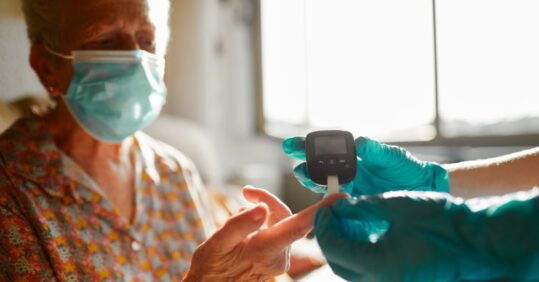Covid-19: Nurses fear impact on care for elderly with diabetes

More than half of GPs, practice nurses and community nurses worry that the focus on Covid-19 has negatively affected the care of the elderly and frail with type 2 diabetes.
This is according to a survey of 30 practice nurse, 30 community nurses and 100 GPs carried out in July and August by pharmaceutical company Boehringer Ingelheim.
Exactly half of practice nurses, 57% of community nurses and 60% of GPs surveyed said the care of elderly and frail patients with type 2 diabetes had been ‘very’ or ‘quite’ impacted by Covid-19.
Related Article: Funded nurse workforce plan needed for neighbourhood health services
Dr Nadeem Ashraf, medical lead for the Cardio-Renal-Metabolism at Boehringer Ingelheim, warned that the ‘Covid-19 pandemic has added strain to already-stretched teams when it comes to managing elderly and frail people with type 2 diabetes’.
Dr Ashraf also cautioned that the ongoing consequences of the pandemic are expected to be felt this winter and that healthcare professionals must ‘get more support to address any concerns in care and confidence in the care delivery to these vulnerable people’.
The survey also found 51% of respondents believe elderly people with diabetes are being better managed day-to-day in the community than in care homes.
On average, 25% feel elderly and frail patients with type 2 diabetes are being over-treated with multiple medications to manage their blood sugar levels.
Nearly two thirds (64%) also highlight that care plans for those patients are not being updated regularly enough and 75% said they do not always have the time to commit to regularly updating them.
Related Article: Nurse had to ‘freeze’ PPE during pandemic to re-use in care home, Covid inquiry hears
Most (73%) nurses surveyed strongly agreed or agreed that they feel confident in assessing the impact of age and frailty on their type 2 diabetes patients, but only 43% of GPs said the same.
If type 2 diabetes is poorly managed, the consequences can be long-lasting and serious, particularly as mismanagement of blood sugar levels can lead to dangerously low blood sugar (hypoglycaemia).
Dr Ashraf continued: ‘Type 2 diabetes already puts huge amounts of pressure on the system, costing the NHS nearly £14 billion each year, of which only around £1 billion is attributed to the cost of medications and the remainder is due to managing complications.
Related Article: More nursing apprenticeships and changes to student travel expenses
‘Even though this burden is becoming more visible, it’s clear that more needs to be done to support healthcare teams across all settings so that they are better able to individualise care decisions and protect these hugely vulnerable people.’
In July, head of care at Diabetes UK Daniel Howarth told Nursing in Practice that practice nurses and community nurses are ‘absolutely critical’ to ensuring people with diabetes continue to receive appropriate care during the Covid-19 pandemic.

See how our symptom tool can help you make better sense of patient presentations
Click here to search a symptom




